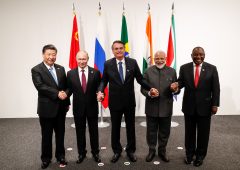BRICS: Why did Argentina refuse to join the union?
18.01.2024 13:00 3 min reading
After the inauguration of President Javier Millay in December 2023, his government decided not to join Argentina in the BRICS group, withdrawing its planned membership in January 2024.
This decision, while winning approval from Millay's supporters, also signals a strategic shift toward strengthening economic ties with the United States, leaving room for potential BRICS participation in the future.
During the 15th BRICS Summit in Johannesburg, South Africa in August 2023, plans for the inclusion of Argentina and five other countries in BRICS from January 2024. Shortly before the official acceptance by Argentina, however, President Millay conveyed failure is in a letter to BRICS leaders, citing the inappropriate time for such a step.
Several factors influenced Argentina's decision to refrain from joining the global framework. First of all, Miley's commitment to fulfilling her campaign promises played a crucial role. During the election, he consistently opposed Argentina's entry into BRICS, arguing that the country sticks to the US and Israel and does not want to ally with communist countries.
In addition, the new government, under the leadership of Millay, departed from the foreign policy of the previous administration. Millay's approach included significant domestic reforms, such as cutting government spending, devaluation of the peso, and non-renewal of contracts to reduce public spending and tackle inflation.
Second, the departure of the current government from the previous one is rooted in economic considerations. The previous government faced a prolonged economic downturn characterized by four years of economic contraction, a staggering 142.7% cumulative inflation over the last 12 months and a generally poor economic performance. By distancing himself from the unpopular policies of the previous administration, Miley aims to win public approval.
Finally, the Argentine government under Millay strategically aligned itself with the US, expressing an ideological preference for the American development model over China's. Although Millay's criticism of China has been noted, securing US support is critical to Argentina's economic stability.
The government is seeking funding from the US government, private investors and the International Monetary Fund (IMF) to address economic challenges, including dwindling reserves and rising foreign debt.
Despite the current position of refusing to join BRICS, the Miley government may reconsider its position in the future. The geopolitical environment, marked by heightened rivalry between the US and China and the US and Russia, provides Argentina with an opportunity to gain US support while keeping its distance from the BRICS led by China and Russia. This strategic move is in line with the consensus in American political and academic circles that see BRICS as an alternative world order.
In conclusion, the Millay government's decision to refuse provisional BRICS membership reflects a mixture of ideological alignment, domestic political considerations and strategic economic priorities. Although the current position prioritizes ties with the US, future events may affect Argentina's position within BRICS.
-
1
UK with strong first quarter performance - is the recession over?
10.05.2024 20:30 2 min reading -
2
BRICS: Serbia may join the union in 2024
14.04.2024 8:00 2 min reading -
3
This is the best time to get rich - Robert Kiyosaki
03.05.2024 14:00 1 min reading -
4
Another big bank has collapsed and is being seized by regulators
27.04.2024 13:30 1 min reading -
5
BRICS: Huge news from Russia and China
09.05.2024 13:30 2 min reading
UK with strong first quarter performance - is the recession over?
The latest official data released on Friday showed a steady recovery in Britain's economy in the first quarter of the year, marking the end of what economists call a "technical recession".
Nexo announced a $12 million token giveaway
To celebrate its 6th anniversary, Nexo launched its largest airdrop to date – $12 million in NEXO tokens.
Binance has received another fine for violations of money laundering laws
On Thursday, Canada's financial watchdog — the Financial Transactions and Reports Analysis Center of Canada (FINTRAC) — announced it had imposed a hefty fine of nearly C$6 million ($4.38 million) on cryptocurrency exchange Binance for violating anti-money laundering laws. of money and the financing of terrorism.
BRICS: Will the union announce its new currency during its next meeting?
The BRICS bloc is preparing for its annual summit scheduled for October in Russia, where the possibility of introducing a new currency for the alliance will be discussed.
-
1
UK with strong first quarter performance - is the recession over?
10.05.2024 20:30 2 min reading -
2
BRICS: Serbia may join the union in 2024
14.04.2024 8:00 2 min reading -
3
This is the best time to get rich - Robert Kiyosaki
03.05.2024 14:00 1 min reading -
4
Another big bank has collapsed and is being seized by regulators
27.04.2024 13:30 1 min reading -
5
BRICS: Huge news from Russia and China
09.05.2024 13:30 2 min reading








